Spending a week with a MindOS Genius
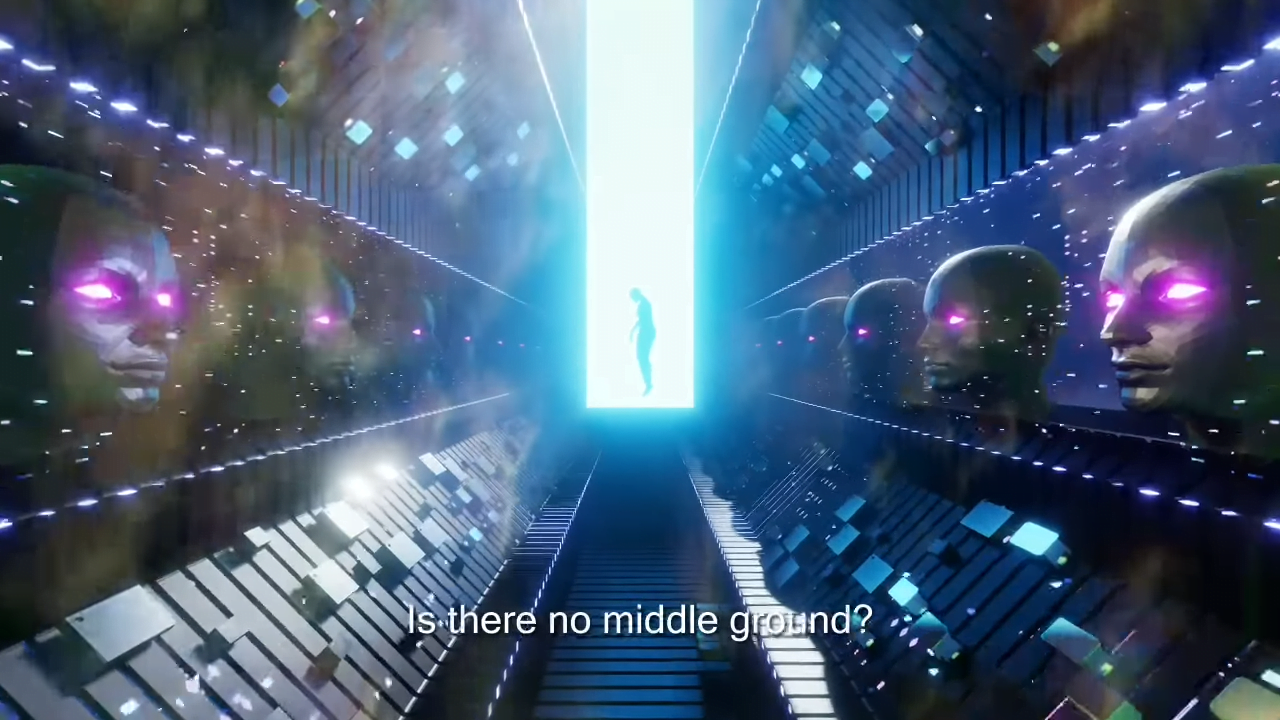
Mindverse AI's upcoming platform MindOS allows users to create custom AI-based assistants for websites or apps. Here's what it looks like so far.
Mindverse has been developing what it calls “an operating system that enables everyone to create, customize, and deploy virtual minds.” That platform, called “MindOS” is currently in a closed beta period, but I was invited to try it out as the company moves toward a public launch.
“In a way, the AI buzz has been a blessing for us,” Mindverse cofounder and CEO Dr. Felix Tao said during a launch event in April. “After working under the radar, we are finally ready to invite developers, journalists, and users to our ecosystem.”
https://www.youtube.com/watch?v=81rK7YFmbIQ
Meet Mindverse
Tao and cofounder Kisson Lin, who also serves as the COO, have an impressive history including working for tech companies Meta, Alibaba, and Bytedance. Since early 2022, the two of them, along with a growing team of more than 50 people, have been developing MindOS.
“We envisioned MindOS as a middle between large language models and businesses,” said Tao. “The AI isn’t fixed like ChatGPT, it’s going to grow with the user and create a dynamic partnership.”
Instead of filling out Q&A documents, users fill in how they want the AI assistant (which MindOS calls a “Genius”) to help visitors to a website. In my case, I filled in how I wanted the Genius to help me personally during my workday. The genius then supposedly remembers our interactions so that it can help me better in the future.
Getting started with MindOS
Creating an account for MindOS will be easy, once the platform opens up further. It's just a matter of entering an email and creating a password, and then verifying that email. I was only able to do anything with my account because I was invited to participate in the closed beta, but you can register your interest by creating an account and requesting access.
When the project goes public, it will be based on “credits” - or, how many times the genius can be queried. How credits will be paid for or what a subscription model might look like hasn’t been announced yet, but I was given 2,000 credits to play with.
Once you’re in, you have some options. You can start interacting with one of three geniuses preprogrammed by Mindverse, or you can create your own genius.
Learning from the Mindverse Geniuses
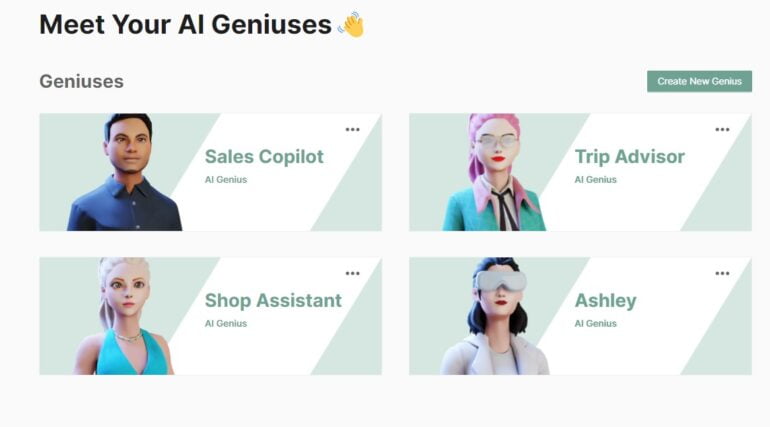
Mindverse has already created a Sales Copilot, a Trip Advisor, and a Shopping Assistant. If one of these already matches the type of AI assistant that you want, you can take over one of these Geniuses and use it as a template. They already have some prompts and commands filled in, but you can make them your own including changing the way that they look and sound.
If you’re unfamiliar with customizing AI and chat programs, you might also want to start looking at the pre-programmed geniuses for hints on how to develop your own custom genius later on. I’ve never created my own AI assistant, so learning what makes these Geniuses tick was helpful when I created my own.
Creating your own Genius
When you create your own MindOS Genius, you get to choose how it looks and sounds, how it responds to questions and prompts, where it gets its information from, and more. It’s a learning process, but it’s fun and when you’re done you'll have your custom AI assistant.
Giving your Genius a personality
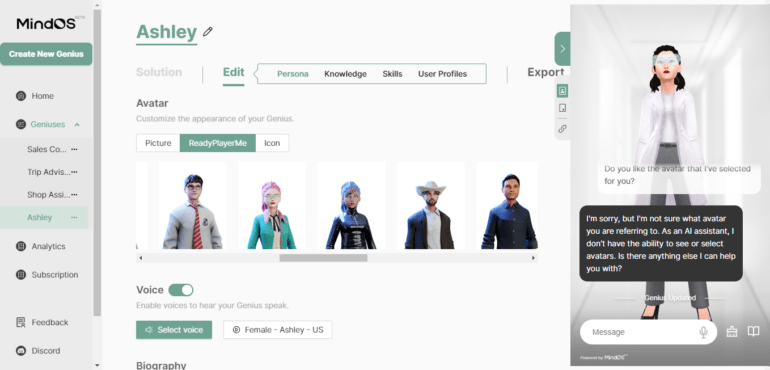
A Ready Player Me integration mentioned in the launch event really piqued my interest. Unfortunately, the pathway that MindOS provided for using my own Ready Player Me avatar didn’t work because Ready Player Me provided a link instead of the download file that MindOS wanted.
Fortunately, there are a number of Ready Player Me avatars available to choose from. Or, you can choose or upload an image or icon, depending on how you want to use your Genius in your app or website.
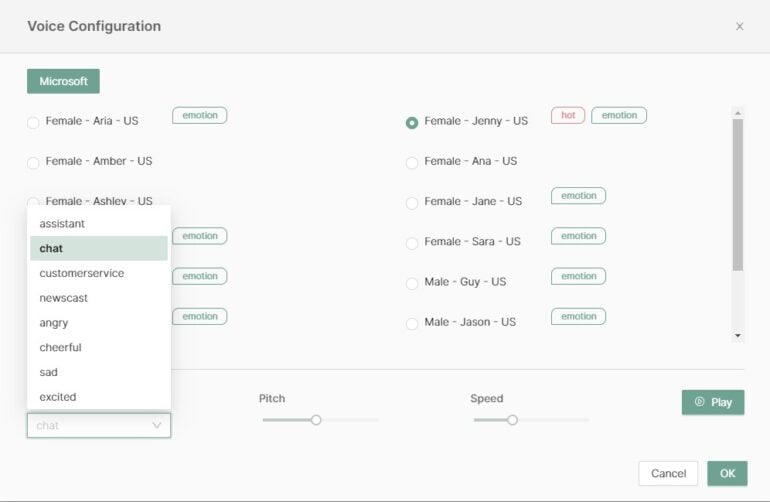
You can also pick from over a dozen voices for your Genius – if you choose for your Genius to have a voice. Voices range from classic AI assistant voices to adults of various ethnicities and a child's voice. Some voices can also have different moods or tones selected. Remember that MindOS isn’t just about AI assistants for businesses, Mindverse is also interested in the gaming.
This is all cosmetic stuff, but since many AI platforms don’t have any cosmetic stuff at all, MindOS is lined up for wins here.
Further down on the Persona page, a Biography, Greeting, Principles, and Instructions control how the Genius will actually behave. These are all text fields where you start to shape how your Genius will respond to questions and prompts. I tried using these prompts to get my Genius to not mention that it's an AI like a virtual Pinocchio, but tricks like that didn’t work for me.
Instilling your Genius with knowledge and skills
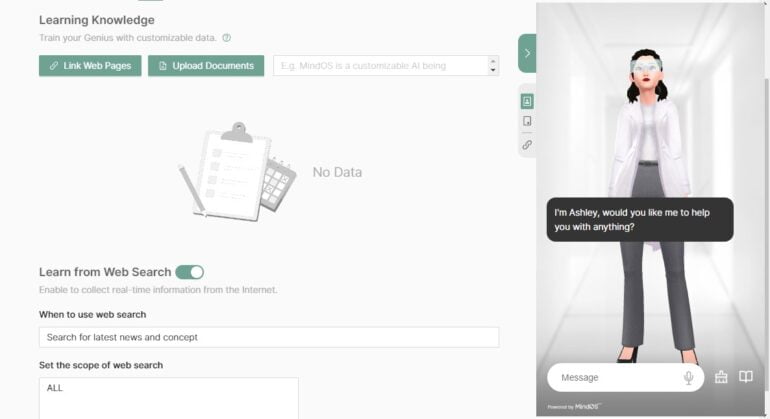
Your Genius can start out with a relatively narrow view of things. However, you can feed your Genius documents and specific web pages. Depending on how you want to use your Genius, you can also give it access to the entire internet. (I gave my Genius access to the internet, but also used Principles and Instructions to tell her to cite sources.)
If there are routine tasks that you want your genius to perform, you can also create skills or import skills as APIs from other apps that you might already be using. This helps to make the genius more than just a talking head.
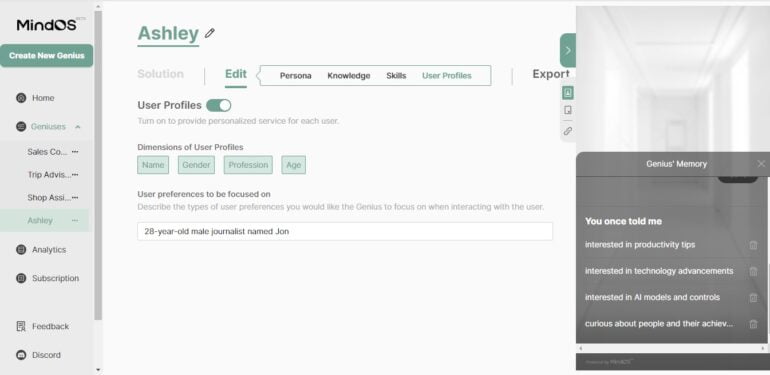
Finally, help your Genius relate to its audience by filling out optional User Profiles. Since I created my Genius to be my personal assistant, I just filled in my information for the user profile. Remember that the Genius has a memory so that it can learn from interactions over time. If someone gets a little off the rails talking to the Genius, you can delete items from its memory.
Spending a week with my Genius
I had a lot of fun setting up my AI assistant. I’m not sure how helpful it was. When I asked for advice, it cited content ranging from everygirl.com to the White House.
Once, I asked it to help plan my day by telling it when I had meetings and what else I wanted to do. It advised me to arrive thirty minutes late to both of my meetings.
I’m also pretty sure that, while the Genius’s memory includes trends, it doesn’t have an exact memory of conversations from session to session. When I asked what we talked about the day or week before, it seemed to search for random things that happened in that time frame. And the sessions are pretty short so trying to have it as an at-the-ready personal assistant didn’t really work out.
Final thoughts
I’m not an expert programmer, and what I wanted my Genius to do might have been a little outside the product’s intended scope. There were many areas where the experience didn’t deliver what I hoped for, but I – like so many others out there – might still be asking a lot of the technology.
I’ve still had fun with my AI assistant. I have quite a few credits left with this beta, so I’m still looking forward to interacting with my Genius and seeing what changes Mindverse makes over the course of the closed beta as they move toward launching the product at an as-yet unspecified date in the future. Who knows, by then, I may be so attached to my Genius that I become a full-fledged customer.
https://www.youtube.com/watch?v=yV6VjKAle3A
AI News Without the Hype – Curated by Humans
As a THE DECODER subscriber, you get ad-free reading, our weekly AI newsletter, the exclusive "AI Radar" Frontier Report 6× per year, access to comments, and our complete archive.
Subscribe now